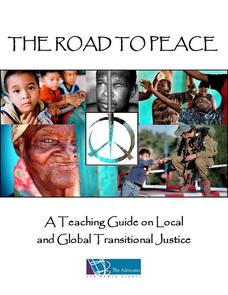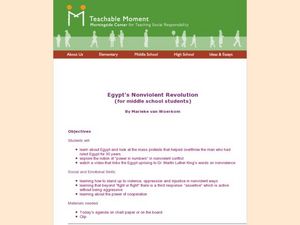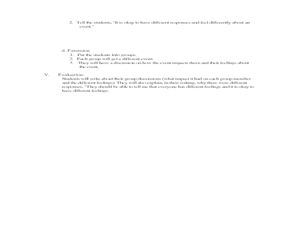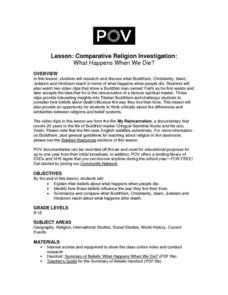California Department of Education
Plagiarism is Stealing!
Stop, thief! Do your pupils understand the consequences of plagiarism? Lesson three of six in a series of college and career readiness activities demonstrates the dangers of taking credit for someone else's work. Learners engage in...
Stanford University
Civil Rights or Human Rights?
Young citizens consider the American civil rights movement as part of the global struggle for human rights. After using a timeline activity to learn about the major events in the civil rights movement, class members study...
Advocates for Human Rights
A Teaching Guide on Local and Global Transitional Justice
The Road to Peace introduces learners to the concept of transitional justice, a process where nations examine the causes of conflict, identify abuses, and use this information to develop a plan to transition to a society that upholds...
Federal Reserve Bank
The Story of the Federal Reserve System
Prevent the Federal Reserve System from becoming a dry topic for your middle and high schoolers by using an informative, engaging resource! The cartoon takes your class on a journey with aliens from the planet of Novus to observe the...
Curated OER
Current Event Jeopardy
Students read current event magazines and newspapers, and highlight questions and answers that are to be used for a class Jeopardy Game. They participate in class Jeopardy Game.
Curated OER
Imus Struggling to Retain Sway as a Franchise
Students will perform research and reflect upon a newspaper article. The lesson will help them to refine reading and cognitive skills of forming a personal opinion. The learners will ultimately learn and grow into a greater understanding...
Curated OER
Middle East Related
Eighth graders find a current event related to the Middle East. In this current event lesson students write a brief summary of a new story related to the Middle East. They give their opinion and tell how it affects their life or who it...
Curated OER
Through the Eyes of a Child
Young scholars explore how documentaries can present realistic and sometimes difficult perspectives on events in our world. They choose current issues that interest them and create their own documentaries.
Curated OER
Identifying and Dispelling Stereotypes
Students address stereotypes. In this cultural diversity lesson, students define stereotypes, share examples of prejudice, research current event issues in given nations, and create posters that feature unbiased news stories.
Curated OER
The Political Dr. Seuss
Students discuss the role political cartoons have played in U.S. politics and public affairs since the 1700's. They analyze some of the political cartoons Dr. Seuss drew during World War II and discuss how these cartoons conveyed his...
Curated OER
Egypt's Nonviolent Revolution
Middle schoolers explore the nonviolent protests of the Egyptians. In this current events lesson, students watch a video and read articles about the 2011 Egyptian uprising. Middle schoolers compare the Egyptian protest to the...
Curated OER
Breaking News: Chinese Writer to Have Shakespeare's Face
Students explore current events by completing a list of worksheet activities. In this William Shakespeare lesson, students identify a resident of China who wishes to undergo plastic surgery to give himself the face of William...
Curated OER
NYC Muslim Community Center: Why there? Why not?
Students examine religious diversity issues. In this current events instructional activity, students read the provided articles "Sacred Ground or Bridging a Cultural Divide?" "Multiple Views of the Proposed Muslim Center," and "Protests,...
Curated OER
After the Fact
Students investigate summaries of the "9/11 Report" and examine questions relating to its findings in a fishbowl discussion. They reflect in writing on how they wish the outcomes of this report would be resolved and how these outcomes...
Curated OER
Mapping the News
Students explore cartography. In this map skills and map making lesson, Students work in groups to create wall size world maps including legends, compass roses, latitude and longitude, and physical features. Students collect...
Curated OER
Feelings about Current Events
Students explore feelings about negative events. In this health and social studies instructional activity, students discuss and write about personal feelings about events that have had an impact on their life, such as hurricanes,...
Population Connection
Meeting Human Needs
How to meet the needs of people around the globe—a question many ask. The fifth in a six-part series about human population and its effects on the globe, the eye-opening lesson includes discussion, a homework activity, and an in-class...
Curated OER
Lesson 3: Japan's "Southern Advance" and the March toward War, 1940-1941
High school historians interpret historical evidence presented in primary resources to decide if the southern advance was a reckless step toward war, or if it was reasonable. They research the Japanese southern advance tactics during the...
Curated OER
A Day of Infamy:Analyzing FDR’s Pearl Harbor Address
In 1941 FDR spoke out on the events at Pearl Harbor. The class will get to analyze word choice, word meaning, author's craft and structure by analyzing an actual draft of this speech. They will look critically at the words used,...
University of the Desert
What Is Extremism?
By participating in discussions using prompts and statements provided in the lesson plan, learners identify the concept of extremism and consider what causes violent acts of extremism in the modern world.
US Institute of Peace
Simulation on The Israeli-Palestinian Conflict
How do you solve a conflict that's been around for so many years? Scholars discover the viewpoints of stakeholders in the Israeli-Palestinian conflict during an emotionally charged simulation. A facilitator moderates discussions between...
Alabama Department of Archives and History
Alabama and the Treaty of Versailles
As part of a study of the treaty that ended World War I and the seeds of resentment it planted, class groups compare President Wilson's Fourteen Points and the articles of the Treaty of Versailles.
Constitutional Rights Foundation
History of Immigration From the 1850s to the Present
The Statue of Liberty may embrace the huddled masses of the world, but has American society always joined in? After young historians read a passage about the history of American immigration in the 19th and 20th centuries, focusing on...
American Documentary
Comparative Religion Investigation: What Happens When We Die?
How do different religions offer explanations for what happens when we die? Invite your learners to consider the variance and complexity of religious beliefs, and to research and compare/contrast the concept of death and afterlife...























